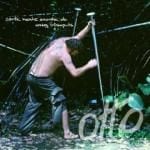
Otto has a background in the mangue beat movement created during the early 1990s in the northeastern Brazilian city of Recife by acts such as Chico Science, Nação Zumbi, and Mundo Livre S/A. These groups sought to mix the percussive folk music traditions of the area with imported music such as rock, rap, and hip-hop. As well as working with these groups, Otto has released three solo albums — starting with the percussion-heavy Samba Pra Burro in 1998 – that follow a similar program of hybridization and the soaking-up of influences. The word mangue refers to the mangrove swamps around the Recife area and, as Larry Crook suggests in his book on northeastern Brazilian music, the mangroves acted as a powerful metaphor for the processes of soaking-up and fertilization that these musicians pursued.
Otto’s fourth album Certa Manhã Acordei de Sonhos Intranquilos continues the process while moving the singer and multi-instrumentalist in subtle new directions. The title translates as “One Morning I Awoke From Uneasy Dreams” and refers to the opening line of Franz Kafka’s story “The Metamorphosis”, suggesting immediately that changes are underway. The opening track, “Crua” (“Raw”), rings these changes, pushing the trademark percussion further to the background and bringing string orchestration and electric guitar into the spotlight. For those conversant in Portuguese, there is an appropriately raw, explicit lyric to accompany the music.
“O Leite” (“Milk”) features vocals from Brazilian cantora CéU, whose own recent albums have been causing something of a stir and have offered international listeners a change from the heavily marketed nu-bossa of Bebel Gilberto and company. The two singers’ voices work well together, both alternating between smooth and ragged styles over some finely patterned percussion. Like CéU, Otto’s vocals have a real sense of body, fleshing out his impressionistic lyrics. “Janaina” is a great track that pitches itself somewhere between reggae and Touareg-style electric rock while still sounding thoroughly Brazilian due to the percussion and Otto’s vocals, which again mix the rough with the smooth to captivating effect. As the driving bassline, snaking electric guitar, and saxophone coalesce during the song’s instrumental breaks, it becomes clear that Otto and his band have put considerable thought into the arrangements for this album.
Electric guitar again drives “Meu Mundo” (“My World”) while studio trickery distorts the vocals and squelchy electronica works its way into the music, lending the track the quality of a dance mix. The guitar is set to screeching mode for the intro to the six-minute “6 Minutos” before falling away to allow Otto to deliver one of his most melodic vocals over a quite conventional drum pattern. As the lyric progresses into a meditation on time, existence, and death, Otto’s voice becomes grainier, the guitar returns, and the track becomes increasingly dramatic. It’s a tour de force and one of the best tracks on the album.
There are two more duets, “Lagrimas Negras” and “Saudade”, both featuring Mexican-American singer Julieta Venegas and employing Spanish and Portuguese lyrics. Venegas and Otto recorded the songs for the Carlos Bolado movie Solo Dios Sabe (2007), which explores the fate of a young couple (a Brazilian and a Mexican) across three countries. These singers were ideal choices to soundtrack the story, not only due to their cultural background but also because they represent an internationalism similar to that depicted in Bolado’s film. That said, both songs are arguably more effective in the context of a soundtrack than on Otto’s album, marked as it is by a sonic adventurism that is somewhat lacking in these numbers.
“Filha” (“Daughter”) is another standout track, fusing intricate percussion with a yearning, memorable melody and a moving refrain. The album closes with more orchestration — this time orchestral jazz — on “Agora Sim”, which also finds space for some spare but heavy drumming. Otto’s feel for sonic texture extends to the words he delivers, which rely more on phonetic connection — “o jeito, o medo, o beijo, o vero, o ero, o raro” and “O olho tosco, o rosto, sopro, gosto ruim” — than on literal meaning.
The New York Nublu label has already put out a number of fascinating Brazil-related releases from the likes of Forro in the Dark and 3 na Massa that have suggested the rich variety of sounds, rhythms, and textures available to those interested in Brazilian music with an alternative twist. Otto makes a welcome addition to their roster and will hopefully continue to release metamorphic music of the quality found here.

![Call for Papers: All Things Reconsidered [MUSIC] May-August 2024](https://www.popmatters.com/wp-content/uploads/2024/04/all-things-reconsidered-call-music-may-2024-720x380.jpg)



